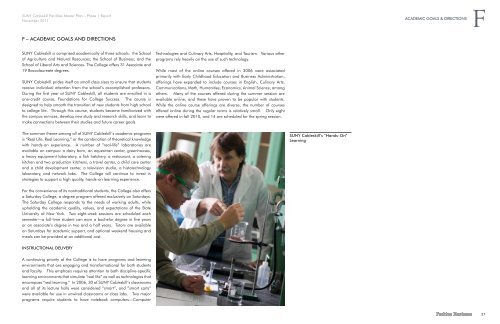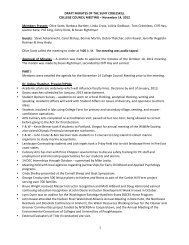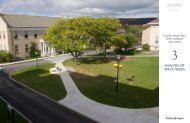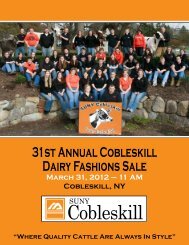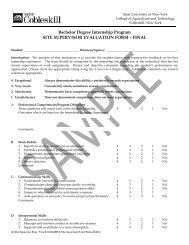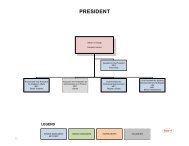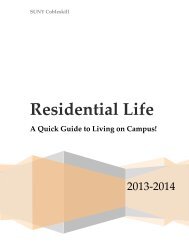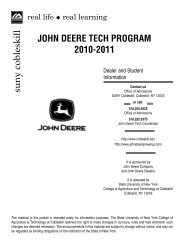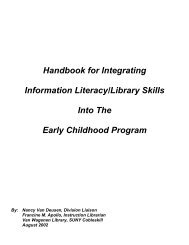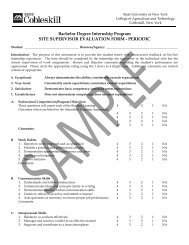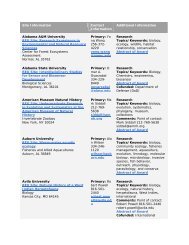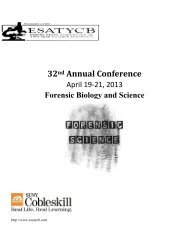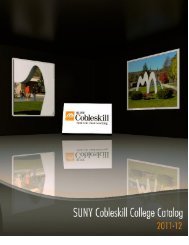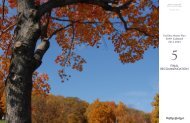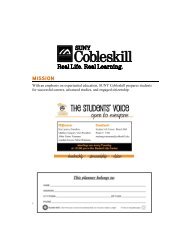Part 1: Campus Profile - SUNY Cobleskill
Part 1: Campus Profile - SUNY Cobleskill
Part 1: Campus Profile - SUNY Cobleskill
You also want an ePaper? Increase the reach of your titles
YUMPU automatically turns print PDFs into web optimized ePapers that Google loves.
<strong>SUNY</strong> <strong>Cobleskill</strong> Facilities Master Plan – Phase 1 Report<br />
November 2011<br />
ACADEMIC GOALS & DIRECTIONS<br />
F<br />
F – ACADEMIC GOALS AND DIRECTIONS<br />
<strong>SUNY</strong> <strong>Cobleskill</strong> is comprised academically of three schools: the School<br />
of Agriculture and Natural Resources; the School of Business; and the<br />
School of Liberal Arts and Sciences. The College offers 31 Associate and<br />
19 Baccalaureate degrees.<br />
<strong>SUNY</strong> <strong>Cobleskill</strong> prides itself on small class sizes to ensure that students<br />
receive individual attention from the school’s accomplished professors.<br />
During the first year at <strong>SUNY</strong> <strong>Cobleskill</strong>, all students are enrolled in a<br />
one-credit course, Foundations for College Success. The course is<br />
designed to help smooth the transition of new students from high school<br />
to college life. Through this course, students become familiarized with<br />
the campus services, develop new study and research skills, and learn to<br />
make connections between their studies and future career goals.<br />
Technologies and Culinary Arts, Hospitality, and Tourism. Various other<br />
programs rely heavily on the use of such technology.<br />
While most of the online courses offered in 2006 were associated<br />
primarily with Early Childhood Education and Business Administration,<br />
offerings have expanded to include courses in English, Culinary Arts,<br />
Communications, Math, Humanities, Economics, Animal Science, among<br />
others. Many of the courses offered during the summer session are<br />
available online, and these have proven to be popular with students.<br />
While the online course offerings are diverse, the number of courses<br />
offered online during the regular terms is relatively small. Only eight<br />
were offered in fall 2010, and 14 are scheduled for the spring session.<br />
The common theme among all of <strong>SUNY</strong> <strong>Cobleskill</strong>’s academic programs<br />
is “Real Life: Real Learning,” or the combination of theoretical knowledge<br />
with hands-on experience. A number of “real-life” laboratories are<br />
available on campus: a dairy barn, an equestrian center, greenhouses,<br />
a heavy equipment laboratory, a fish hatchery, a restaurant, a catering<br />
kitchen and two production kitchens, a travel center, a child care center<br />
and a child development center, a television studio, a histotechnology<br />
laboratory, and network labs. The College will continue to invest in<br />
strategies to support a high quality, hands-on learning experience.<br />
<strong>SUNY</strong> <strong>Cobleskill</strong>’s “Hands-On”<br />
Learning<br />
For the convenience of its nontraditional students, the College also offers<br />
a Saturday College, a degree program offered exclusively on Saturdays.<br />
The Saturday College responds to the needs of working adults, while<br />
upholding the academic quality, values, and expectations of the State<br />
University of New York. Two eight-week sessions are scheduled each<br />
semester—a full-time student can earn a bachelor degree in five years<br />
or an associate’s degree in two and a half years. Tutors are available<br />
on Saturdays for academic support, and optional weekend housing and<br />
meals can be provided at an additional cost.<br />
INSTRUCTIONAL DELIVERY<br />
A continuing priority of the College is to have programs and learning<br />
environments that are engaging and transformational for both students<br />
and faculty. This emphasis requires attention to both discipline-specific<br />
learning environments that simulate “real life” as well as technologies that<br />
encompass “real learning.” In 2006, 30 of <strong>SUNY</strong> <strong>Cobleskill</strong>’s classrooms<br />
and all of its lecture halls were considered ”smart”, and “smart carts”<br />
were available for use in unwired classrooms or class labs. Two major<br />
programs require students to have notebook computers—Computer<br />
27


